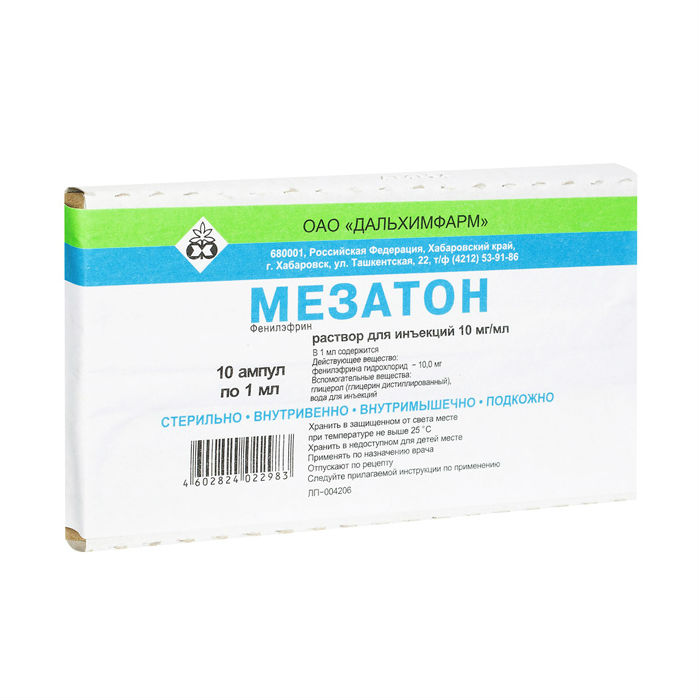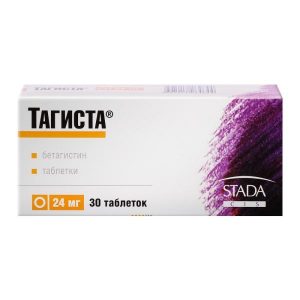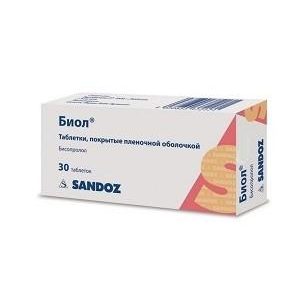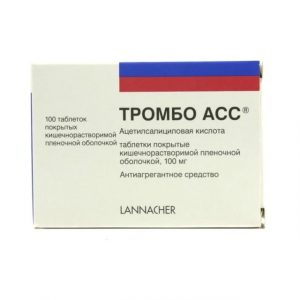Description
Release form
Injection.
Packing
10 pcs.
Pharmacological action
Adrenomimetic. It has a direct stimulating effect mainly on -Adrenoreceptors.
With systemic use, it causes narrowing of arterioles, increases OPSS and blood pressure. Cardiac output does not change or decreases, which is associated with reflex bradycardia (an increase in the tone of the vagus nerve) in response to arterial hypertension. Phenylephrine does not increase blood pressure as dramatically as norepinephrine and epinephrine, but it lasts longer. This, apparently, is due to the fact that phenylephrine is more stable and does not collapse under the influence of COMT.
When applied topically, phenylephrine has a pronounced vasoconstrictor effect, causes mydriasis, can lower intraocular pressure with open-angle glaucoma.
At moderate therapeutic doses, virtually no effect on the central nervous system.
Indications
Inside and topical: to reduce swelling of the mucous membrane of the nasopharynx, conjunctiva for colds and allergies (mainly as part of combination preparations).
Parenteral: to increase blood pressure during collapse and arterial hypotension due to a decrease in vascular tone.
Contraindications
Arterial hypertension, severe atherosclerosis, tendency to spasm of coronary vessels, hypersensitivity to phenylephrine.
Special instructions
The use of phenylephrine in patients with severe hyperthyroidism should be avoided.
Use with caution in CHD.
When applied topically after absorption through the mucous membrane, phenylephrine can cause systemic effects. In this regard, the use of phenylephrine in the form of 10% eye drops in infants and elderly patients should be avoided.
Composition
Active ingredient: phenylephrine hydrochloride 10 mg
Excipients: glycerin water for injection
Dosage and administration of
When administered orally and topically, the dose depends on the indications and the dosage form used.
With the introduction of sc or i / m, a single dose is 2-5 mg, then, if necessary, 1-10 mg. With the on / in the introduction of jet (slowly) a single dose is 100-500 mcg. With IV infusion, the initial rate is 180 mcg / min. further, depending on the effect, it is reduced to 30-60 mcg / min.
Maximum doses: for adults, when taken orally, a single dose – 30 mg, daily – 150 mg sc or i / m single dose – 10 mg, daily – 50 mg with iv single dose 5 mg, daily – 25 mg .
Side effects of
From the cardiovascular system: undesirable long-term increase in blood pressure, tachycardia or reflex bradycardia are possible.
Local reactions: possibly irritating to the mucous membranes.
Drug Interactions
When using phenylephrine against the background of general anesthesia caused by halothane or cyclopropane, ventricular fibrillation may develop.
With simultaneous use with MAO inhibitors, potentiation of the effects of phenylephrine is observed (including with topical application).
Phenothiazines, alpha-blockers (phentolamine), furosemide and other diuretics reduce the vasoconstrictor effect of phenylephrine.
Guanethidine enhances the mydriatic effect of phenylephrine (with systemic absorption).
Oxytocin, ergot alkaloids, tricyclic antidepressants, furazolidone, procarbazine, selegiline, sympathomimetics enhance the pressor effect, and the latter increase arrhythmogenicity.
With the simultaneous use of beta-blockers reduce pacemaker activity against the background of reserpine, arterial hypertension is possible (due to depletion of catecholamines in adrenergic neurons, sensitivity to sympathomimetics increases).
Overdose
Manifested by ventricular extrasystole and short paroxysms of ventricular tachycardia, a feeling of heaviness in the head and limbs, a significant increase in blood pressure.
Treatment: iv administration of alpha-blockers (e.g. phentolamine) and beta-blockers (for rhythm disturbances).
Storage Conditions
In a dark place at a temperature not exceeding 25 ° C.
Expiration
3 years.
Active ingredient
Phenylephrine
Terms leave through pharmacies
In retseptu
lekarstvennaja form
Solution for




